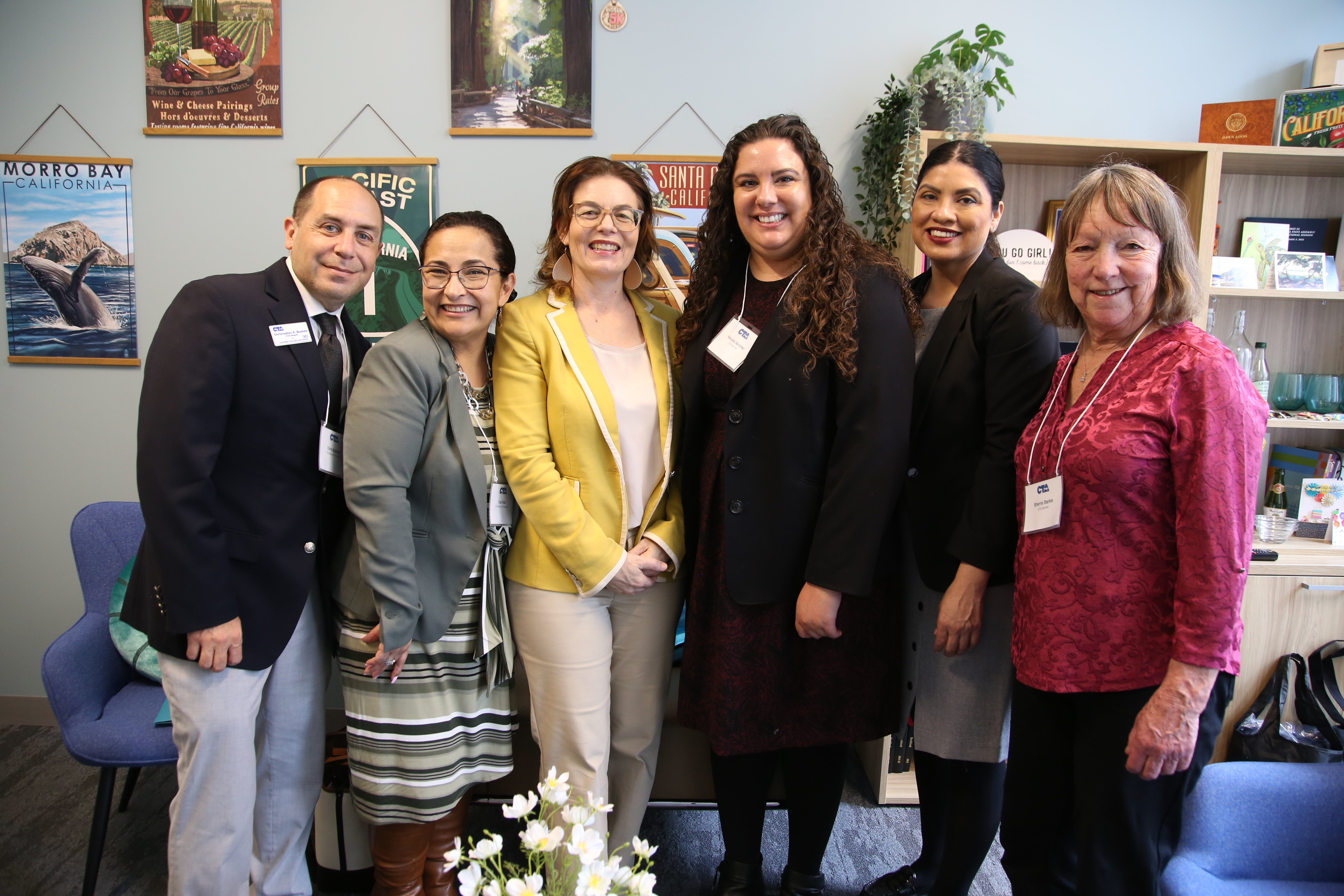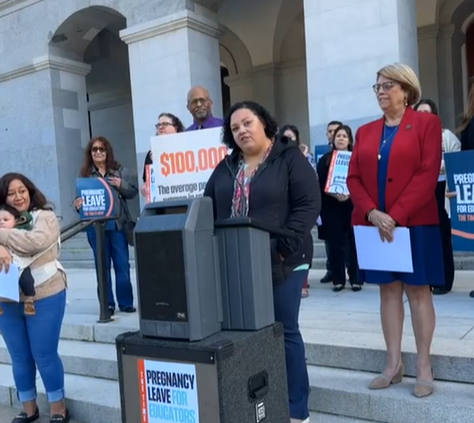
“I AM CURRENTLY PREGNANT with my first child. Rather than being excited, my husband and I are trying to plan how to pay our bills and make sure we have food on the table even though I have a great job and benefits,” says speech language pathologist Ashley Thompson, a member of Menifee Teachers Association. “My child deserves a mom who is present, not one concerned about returning to work as soon as possible so I can receive my full pay.”
Countless educators in our union can relate to this story or a similar version of it. The lack of paid pregnancy leave for public school and community college employees has impacted generations of educators, deepening the widely documented gender wage gap well into retirement. With the backdrop of reproductive rights under attack across the nation, CTA members are rising up together to demand change.
CTA’s historic sponsored legislation — AB 2901 (Aguiar-Curry) — will provide 14 weeks of paid pregnancy leave to educators and finally end the long-standing practice that unjustly punishes teachers for having children. The change is long overdue in a public education system where three-quarters of educators are women.
In mid-March, the hallways of the State Capitol were filled with educators, as CTA members met with elected officials to discuss the need for AB 2901, share their stories and ask for legislators’ support as the bill makes its way through the State Assembly and Senate over the next few months.
“Having protected paid leave for pregnancy is crucial to keeping our teachers. We should not have to choose between doing what is best for our family and our careers that we love so much.”
—Bree Koontz, teacher, Irvine Teachers Association
“California is the fifth-largest economy in the world yet there are countries whose economies are less than California’s and they’ve figured it out,” says CTA Secretary-Treasurer Erika Jones, who recently gave birth to her first child. “How can we can have this much money and power and we can’t take care of women in this state?”
Under current state law, educators do not earn any paid pregnancy leave, forcing them to make difficult decisions when considering growing their family. Teachers must exhaust all sick time to be able to access differential pay (less the cost of a substitute), leaving them with the decision to either schedule pregnancies around the school calendar or try to get by with substantially less pay. The current practice discriminates against women as they are required to deplete their leave balances to bear children and are often forced to return to the classroom before they are physically and emotionally ready.
This campaign to bring paid pregnancy leave to California educators has sparked thousands of educators to share their personal story on a petition urging legislators to vote yes on the bill. As of April 4, the petition had 8,575 signatures.
“Nine months ago, I became a mom. Unfortunately, because I only received half-pay, I felt I had no choice but to return to work after 12 weeks. It was an incredibly difficult decision to make.”
—Cristal De La Rosa, teacher, Alhambra Teachers Association
“When my second daughter was born, I went back to work eight weeks postpartum after a cesarean section,” says teacher Amelia S. “I was still bleeding so heavily that I had to wear adult diapers to work.”
And since educators are forced to exhaust all sick time while recovering and bonding with their baby, there is none available when newborns get sick or have medical appointments, meaning that new mothers must take unpaid days off for the rest of the school year. This discovery is shocking for many new educators.
“I am about to go on maternity leave and realize how few supports there are for women educators wanting to start a family,” says school counselor Aubrey Buchanan, a member of Visalia Unified Teachers Association. “Running out your sick time as ‘maternity leave’ is ridiculous, and returning to work with a new baby and no sick time is even more ridiculous!”
“As a Women’s Studies teacher, I talk to my students about the disparity between male and female teachers regarding the ‘maternity penalty.’ It does affect retirement and women shouldn’t be penalized for bringing future generations into the classroom!”
—Jessica Jacobs, teacher, Tahoe Truckee Teachers Association
The financial impacts of this inequity are long-lasting — because women are forced to use all sick time with each pregnancy, they have substantially less sick days at retirement, meaning that they need to work longer or earn less in retirement. On average, women receive almost $100,000 less in retirement than their male colleagues.
“After 35 years of teaching, the lack of pregnancy leave is still affecting me in retirement,” says Susan Heflin, a member of CTA/NEA-Retired. “I lost about six months on my years of service credit in retirement from my pregnancy leaves, but I also lost the years of service credit for the lost sick days. It’s not right!”
This effort to fix a broken system is just the latest example of educators working together in their union to improve working conditions for educators.
In 1975, educators in two local chapters in Mt. Pleasant and Berryessa school districts organized and filed discrimination lawsuits in the fight for maternity rights. The local school boards had been enforcing policies that would “relieve a woman of their duties without pay when the woman began to show in their seventh month of pregnancy and not allow them back until their child was at least six months old.” Through collective action, the chapters put enough pressure on the district to rescind those policies.
The profession of public education has evolved over the years thanks to the collective power of women and allies working together to fight for their rights. AB 2901 is the next step forward.
Stay up to date on AB 2901 as it progresses through the Legislature, download shareable graphics, join thousands of fellow CTA members in signing a petition in support of the bill, and share your own story by visiting cta.org/ab2901.
“AB 2901 would help women like me be able to confidently continue growing my family,” says education specialist Angeles Llamas, a member of Fresno Teachers Association, “while staying employed and doing what we love most: growing little minds!”
During the pandemic, Clara Hutar, San Carlos Teachers Association, brought her daughter to school when she was setting up her classroom and daycare centers were closed. Hutar, currently pregnant with twins, says “it is so frustrating to think that coming back from my leave, my whole paycheck won’t be enough to cover daycare.”


Victoria Kim, Folsom Cordova Education Association


CTA Board Members Chris Bushee and Eva Ruiz, Asm. Dawn Addis, CTA members Renata Sanchez, Marina Santos and Sherrie Starkie


Jovanna Leon, Golden Plains Teachers Association, and her husband are veteran educators of 10 years in the Central Valley. In March, their daughter was born three months premature and had to be placed in the neonatal ICU. “We have been worried about our sick leave running out and not being able to be there for our daughter in this critical time of her development.”


Vaness Rodas Romero, United Teachers of Richmond, went back to work six weeks after giving birth in 2016. “I did not have any wiggle room since I couldn’t afford it and had to use all my sick leave in order to collect disability.”


“My pregnant self running around on graduation day to assist with graduation practice and all other counseling responsibilities in May 2023,” explains Lissenia Marquez, East Side Teachers Association, of this photo when she was eight months pregnant.


CTA members Gina Whipple, Rachel Merino-Ott, CTA Board Members Wendy Eccles and Grant Schuster, Asm. Monique Limon, CTA member Luciano Ortiz.


CTA Board Member Greg Abt, CTA members Renee Pena and Susan Abt, Asm. Al Muratsuchi.


AB 2901: The Pregnancy Leave for Educator Act
AUTHOR: Assemblymember Cecilia Aguiar-Curry (D-Winters)
SPONSORS: CTA, Superintendent of Public Instruction Tony Thurmond, State Treasurer Fiona Ma
SUMMARY: Grants public school employees up to 14 weeks of leave with full pay when an employee is pregnant or experiences pregnancy-related health issues, including
childbirth, miscarriage, termination of pregnancy or recovery from those conditions.

Advocacy at the Capitol
CTA brought educator power to the State Capitol in February and March to talk with legislators and bring awareness to the long overdue need for paid pregnancy leave for
educators and CTA-sponsored AB 2901 (Aguiar-Curry).
CTA Secretary-Treasurer Erika Jones kicked off the press conference at the State Capitol announcing the Pregnancy Leave for Educators Act. A new mother herself, Jones said educators across the state have expressed how important this issue is to them.
“I have met with concerned teachers across the state who struggle and stress about what their pregnancy needs will be. Teachers have absolutely zero paid pregnancy leave,” Jones said. “The time is now to provide teachers with the dignity to build their families without the added stress of trying to figure out sick days and lower pay. We need to pass AB 2901 now.”
Jones was joined by fellow CTA members and elected leaders including AB 2901 author Assemblymember Cecilia Aguiar-Curry (D-Winters).
“As the author of this bill, I aim to end discriminatory practices that force some of the most important professionals in our society to choose between their careers in service to our children and their financial security, the health of their families and the health of their school communities,” she said.




The Discussion 0 comments Post a Comment